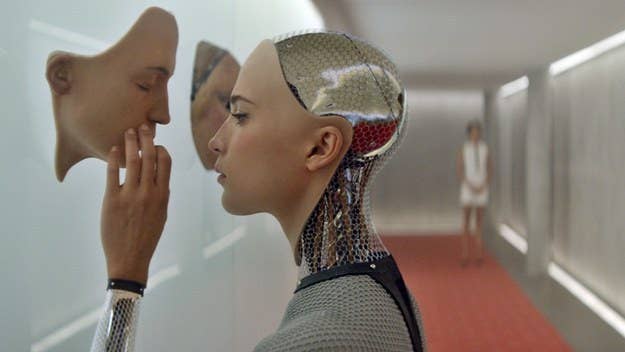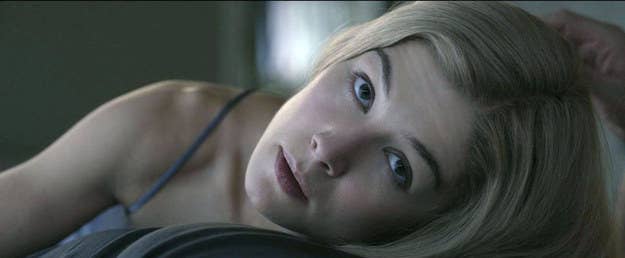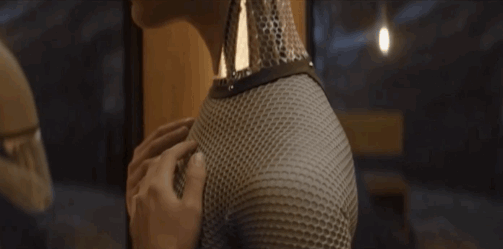
Ex Machina tells the story of a beautiful cyborg trapped in the isolated estate of the reclusive genius who created her, and the young man who feels compelled to save her. Like Her before it, the movie examines the pitfalls of making a female consciousness to male specifications: A male protagonist sees a future for himself with a female artificial intelligence who (spoiler alert) ultimately abandons him to suit her own purposes.
But Ex Machina — more than being a horror film about the scary possibilities of artificial intelligence — is a flawed story about men losing control of women and the bankruptcy of gender roles. Basically, Ex Machina is the Gone Girl of 2015.
In the former, a sci-fi film, a brilliant and extremely rich programmer, Nathan (Oscar Isaac) designs an artificial intelligence to appeal to Caleb (Domhnall Gleeson), a less brilliant programmer who is brought in to test the intelligence of Ava (Alicia Vikander), the machine herself. She manipulates him into caring for her, and the infatuated Caleb sets her free. Unencumbered by human rules, she then leaves him to die after he enables her escape.
In the latter, a melodramatic thriller, Amy Dunne (Rosamund Pike) is compelled to follow her jobless husband (Ben Affleck) from a metropolis to Missouri, where he fails to be the man she married, while she continues looking and acting like the beautiful, thin, cosmopolitan woman he married. In the end, she forces his hand, dedicating the rest of her life to both punishing him and making him hold up his end of the relationship bargain.

Of course, there was more than one possible reading of Gone Girl. If you watched it as a horror film, then it was about male anxiety personified in a psycho bitch who trapped and tortured men by terrorizing them with false rape accusations and matrimony. But if you watched it as a revenge fantasy, then it was about a bitch who revisits the sins of men on them tenfold, holding men to the same unreasonably high standards of perfection to which she herself is held.
Likewise, Ex Machina is about a female character who, at first, seems to embody a male ideal of perfection. She's beautiful, smart, and charming. Like Gone Girl's Amy, who says she's obligated to love blow jobs, Ava is also programmed to love sex. Nathan tells Caleb that there's an orifice between her legs that he's rigged to a "pleasure response"; the hole is designed to be penetrated by a penis. "She'd enjoy it," he says, because like Amy, Ava is made to spec. She has no real choice but to enjoy it.
But the director of Ex Machina, Alex Garland, told Wired that Ava is "literally genderless," that "the things that would define gender in a man and a woman, she lacks them, except in external terms."
How could one's physicality and the way people read gender on one's body be disconnected from gender? Saying Ava is "literally genderless" is at best naive and at worst profoundly stupid. Tell that to any woman who has ever walked down a city street. Or any little girl who knows "you throw like a girl" is an insult. Explain it to a transgender person. "No, that man on the subway who told you your haircut was acceptable to him, he's not reminding you that he thinks you exist to be visually pleasing to him."
And then explain Ava, on whose naked body the camera creepily lingers. Ava, whose face and body are patterned on the porn performers Caleb masturbates to. Ava, with her ingenue dresses and her lost urchin pixie cut crying out to be rescued by a man. She is as gendered as it is possible to be. She has learned her gender.

And it is in this respect that Ex Machina and Gone Girl are very similar. Both feature a monstrous female protagonist who uses the rules men have made to destroy men. There is an inherently misogynistic aspect to this: Patriarchy by and large is really great for men, and anyone who says differently is a liar and possibly a #HeForShe shill. In the real world, it is women who are cut down by men (see: rape, domestic violence, abortion restrictions, etc.). What Ex Machina and Gone Girl want to show you are not individual female villains, but generalized male anxiety over women. The idea that women are liars because men made them to be liars. Ava is an Eve, made by a programmer god, who tempts a man to sin and then leaves him to suffer because ultimately she is not quite as human as he is. Amy is a Delilah, who deceives and emasculates a man because ultimately she is not quite as human as he is.
Ava, because she is a cyborg, and because she has her own selfish agenda that's unrelated to making a man suffer, is the more interesting, independent, fully realized character; Amy is more a wrathful cartoon. But both films share a fear of women.
Gone Girl thinks the accusation of rape is a bigger threat than rape, because a woman can get over being raped, but if a man is accused of rape, it will ruin his life. Ex Machina thinks that man made woman what she is (pretty true) and that she will use this to ruin him (doubtful!). Both movies are at least a little bit sexist, although they both critique the fantasy of the Perfect Woman, and they both see that she is an impossible concoction of the male imagination. But that's where the critique ends. Rather than really examining how men are at fault for these wild expectations of femininity (a perfect girl who fulfills all my desires and asks for little in return!), both films examine how men's expectations are used as a smokescreen by scheming women. The Perfect Woman is not, by this reckoning, a victim. The Perfect Woman is a murderer!
What a world it would be if sexism actually worked in women's favor! But, sadly, it only happens in the movies.
